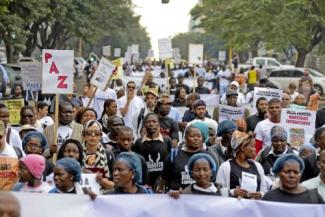Peacebuilding
Mozambique’s “mini-war”

Largely unnoticed by the global community, a “mini-war” broke out in Mozambique at the end of 2013. It involved the security forces of the government, which is run by the Frelimo party, and insurgent militias fighting in the name of Renamo, the opposition party. On major roads in the country’s interior, vehicles were shot at, people died, others were injured. Thousands fled from their villages to neighbouring countries or camps on the outskirts of Mozambique’s urban areas.
The police stormed opposition party offices. Political killings occurred daily. Afonso Dhlakama fled to the Gorongosa Mountains in Sofala Province after escaping assassination attempts. He stayed there, besieged by government troops, until the end of April.
Business, trade and transport had ground almost to a complete halt, but late last year, an internationally brokered ceasefire cooled the situation. How did the crisis escalate in the first place? For a long time, Mozambique was considered a prime example of a country where peace was successfully established after extended civil war.
Indeed, the peace that was reached in 1992 after 15 years of warfare did last two decades. In 2013, however, Renamo took up arms again to force the hand of the Frelimo government, accusing it of not implementing the peace accord. The timing was precise. Parliamentary and presidential elections were scheduled for late 2014. Incumbent President Armando Guebuza was constitutionally barred from running for office again and Frelimo, in government since 1975, was split over who should succeed him. Moreover, corruption and personal enrichment had become endemic. Frelimo’s reputation seemed to have hit rock bottom.
The Frelimo leadership did not like the prospect of an election campaign in the midst of a “mini-war”; but they felt even less inclined to postpone the polls. They thus had no choice but to negotiate a deal with Dhlakama and consider his demands. The demands included the separation of the state from the Frelimo party, sweeping decentralisation of state and administration, better integration of former Renamo fighters into the regular security forces and a fair election campaign. In return, Renamo would stop the guerrilla attacks, participate in the electoral process and thus contribute to the legitimacy of the 2014 elections.
Renamo kept its promises, but found the election results deeply disappointing. Once again, Frelimo won, and so did its presidential candidate, Filipe Nyusi. There were claims of poll-rigging. Renamo initially refused to accept the results. Its MPs were only sworn in after international mediation and some concessions by Nyusi in early 2015.
At the same time, Renamo stepped up the conflict on both the military and political front. It switched from pin-pricking tactics to a full-blown insurgency in the six central provinces where it had won the majority of votes. Among other things, it demanded that Nyusi appoint Renamo members as governors of those provinces. That, however, was a demand the new president could not meet for fear of causing divisions within his own party.
In the second half of 2016, international mediation successfully helped kick-start negotiations between Frelimo and Renamo. In subsequent talks, Renamo dropped most of its demands, but kept insisting on two things: better integration of its former fighters into the security forces and the wholesale decentralisation of state and administration.
In the autumn of 2016, international mediators presented two papers on these issues. Neither has elicited a definitive statement from either conflict party so far. In view of stagnation, the mediators withdrew. Soon after, however, Nyusi and Dhlakama reached a ceasefire agreement and stated to talk with one another directly again in December. Both Nyusi and Dhaklama have recently indicated substantial rapprochement in cautiously optimistic comments, so an end to the “mini-war" may be near. Whether it actually comes to pass remains to be seen.
Friedrich Kaufmann is director of the Southern African-German Chamber of Commerce and Industry (AHK) in Maputo. The views expressed in the article are his own personal opinions.
friedrich.kaufmann@gmx.net
Winfried Borowczak is a social economist and freelance consultant.
winborow@aol.com







